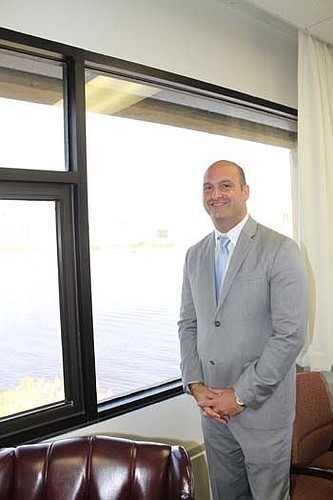
Nikolai Vitti knows what it feels like to be unsuccessful in school.
The Duval County schools superintendent suffers from dyslexia. Because his parents were immigrants who didn’t speak English, nobody realized it for years.
“I liked school socially, but I struggled academically. In fact I didn’t even think of myself as smart,” Vitti said.
He also knows what success feels like.
A Harvard graduate, Vitti has worked as a teacher and administrator in some of the nation’s largest and toughest school districts, led school improvement initiatives for Florida’s Department of Education, and gained a reputation for turning around failing schools.
His rise from humble beginnings has defined his mission as an educator.
Vitti doesn’t just want to run excellent schools. He wants to revitalize a large urban school district, narrow the achievement gap between white and black students, and help the kids who, like him, started life behind the curve. It’s a goal that he says will serve the larger community.
“At the end of the day, the vast majority of our children attend public schools,” he said. “If you don’t have a strong public education system, then you can’t talk about students being prepared to be productive in the workforce or civically engaged.”
Duval has a rap as a poor school district when comparing student performance to its suburban neighbors of St. Johns and Clay counties. Vitti challenged that perception.
“I think you have to look deeper,” he said, “because our district is so much more diverse and larger than St. Johns.”
St. Johns serves students that are largely middle- and upper middle-class. If one demographically isolates the same kinds of place in Duval, for example Fletcher and Mandarin high schools and their feeder schools, Duval becomes more competitive.
Several magnet schools like Douglas Anderson, Stanton, Paxon, and Darnell Cookman have national recognition.
“There are more nationally recognized schools in Duval than in St. Johns.” Vitti said
Also, the entire St. Johns district is only the size of two or three of Duval’s feeder patterns.
It makes more sense, Vitti said, to shift away from neighboring districts and instead look at other large urban districts like Miami-Dade, Palm Beach, Broward, Hillsborough, Orange and Pinellas.
Here, Duval is nearly average in overall performance and it scores high in narrowing the achievement gap between white and black students.
That being said, there’s still work to be done. Narrowing the achievement gap continues to be a key focus. If the poorest students improve, the entire district improves.
To do that, Vitti this year kicked off Quality Education for All, an initiative that aims to staff underperforming schools with the top principals and teachers.
The program has raised $40 million from business leaders to fund bonuses for the best teachers and principals to work in schools where low-income students struggle academically.
“Research shows that regardless of socioeconomic class, parent background, single mother or dual parent, immigrant status, English-language status — the number one factor that contributes to student achievement is teacher effectiveness,” Vitti said.
Vitti knows from personal experience.
Vitti grew up in a working class home in Detroit, the son of Italian and Argentinian immigrants. In school, he struggled in reading, but excelled in basketball, baseball and football.
He never saw himself becoming a teacher. He thought he’d be professional athlete. It was a high school teacher who finally told him how smart he was. He had a natural gift for synthesizing and analyzing information quickly.
“More than anything, that increased my self-esteem,” Vitti said. “It made me stop projecting the assumptions people had of me because they knew me as an athlete. And because I was a struggling reader.”
Vitti attended Wake Forest University in North Carolina on a football scholarship.
After one year, he told his coach he had to stop playing.
“Once I was in college and I was exposed to all this knowledge and information, I literally fell in love with it,” Vitti said. “I saw how advanced my classmates were, and I said ‘I’ve got to catch up.’”
He worked in the library where he constantly read books, even the dictionary. He would go on to become one of the top students in his class, graduating Phi Beta Kappa.
After graduation, Vitti worked as a teacher in low-performing schools in Winston-Salem’s urban core.
Then he and his wife, who also was a teacher, moved to New York City.
“I said, ‘I want to go somewhere where the challenge would be most intense, because if I could do it there I could do it anywhere,’” he said.
Vitti loved teaching and had no ambition to become an administrator. But other teachers pushed him toward it because they saw underperforming students become focused and engaged in his classroom.
As he rose in the field, Vitti remained focused on excellence in public schools, but also on working in underserved communities, both in New York and later in Miami-Dade County.
After the Miami-Dade district became a finalist for the prestigious Broad Award for Excellence in Urban Education, Vitti was pursued by many schools to fill a role as superintendent.
The only place he applied was Jacksonville, a place where he said his experience best fit the community’s need. The fast-rising educator said he’s in for the long haul.
“I felt that this was my destiny. And, I want to be here for a long time,” Vitti said.
“I want to see this through so that I can make this sustainable and eventually look back at the work that was done. There
are only a few large urban districts that have that story to tell, and that’s what I want to be a part of.”
(904) 356-2466